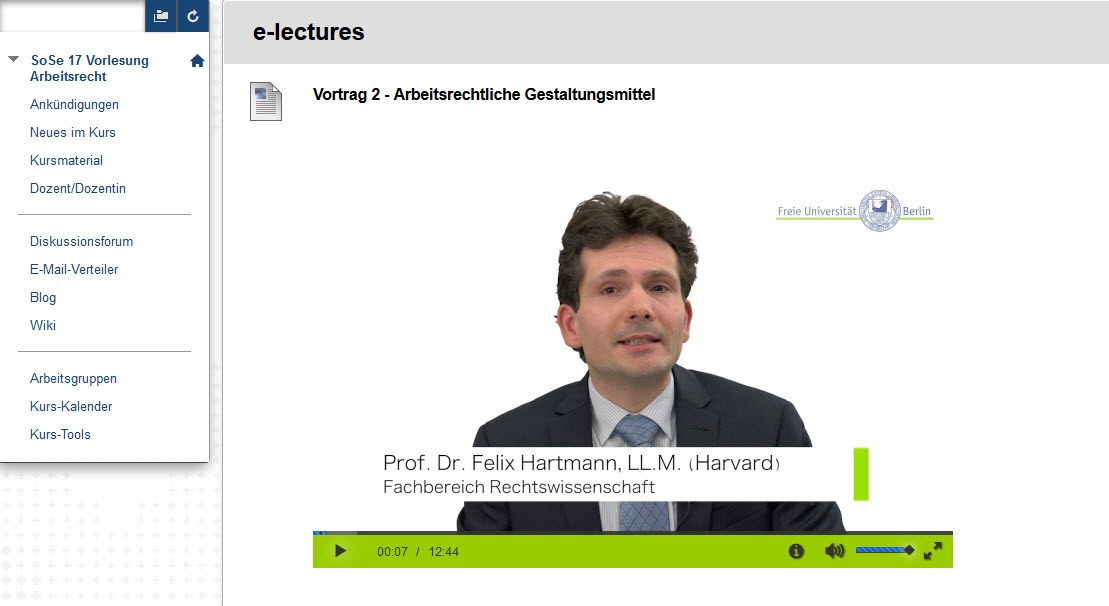Course
| Course title | Lecture "Labor law" |
| Department / Institute | Law |
| Degree program | Mandatory law course |
| No. of participants | Several hundred |
| Phase | 4th semester |
| Duration | The course is offered on an annual basis |
Tools
The video sequences were provided via Blackboard. A supplement using tests and surveys is planned.
Realization
The realization of the project (usage of video recordings) was closely coordinated with Stefan Cordes and Wolfram Lippert of CeDiS. Valuable input was also given by participating in the CeDis course e-teaching for e-learning.
The videos were recorded using the so-called green screen technology. With this, the background and foreground can be easily edited or supplemented after the actual studio recording has taken place. Further information on the green screen studio at the Center for Digital Systems can be found here.
Illustration 1: e-lecture labor law design tools (Blackboard inclusion)
For the recordings two different cameras were used: In the sequences with the wide camera setting the green screen was replaced by slides with bullet points and graphics. In the close-up settings of the lecturer these slides are out of focus in the background.
Illustration 2: e-lecture green screen (inclusion of slides and graphics)
The change between the distance and the close-up camera was successful on two levels: On the one hand, this makes it livelier and, on the other hand, a sensible use of the two perspectives can be lead to a clear division of different sections of the lecture. Altogether 23 e-lectures were recorded.
Further development of the e-lectures
The course is provided on an annual basis. The basic concept of the lecture will be kept to in the coming years and extended as well. As labor law is quickly ever-changing, it may become a requirement to change or edit the lecture videos, maybe even having to re-produce some. The focus of the work in the future, however, should be on improving the dovetailing between lecture videos and the face-to-face sessions. Especially tools for the self-evaluation of one's learning success should be provided. A simple scenario for this could be multiple choice questions or cloze texts. More sophisticated models would be collaborative teaching formats such as wiki-supported case studies worked on in groups.
Evaluation and experiences made by the lecturer
At the end of the semester an evaluation of the course took place. Implemented were questionnaires that, in collaboration with the Study Office of the Law Department, were specifically adjusted to the e-learning scenario in place. The students' reaction to the concept of the course was almost unanimously positive. The significant advantage of the lecture videos that was reported was the fact that one could watch the films repeatedly and pauses could be made in order to, for example, make notes or jot down thoughts. What was also positive was the fact that the videos allowed for more flexibility within one's daily studies with regard to time and place. This special teaching format led to an increased interest in the lecture and the motivation of the students increased significantly, and this noticeably.
From my point of view as an educator I find that the MOC concept as a whole was a success. The necessity of having to produce quite a number of lecture videos in a very short time span was also for me personally an enrichment. During the video production stage I had more time to reflect on my own teaching methods. This is usually not doable in the course of everyday university teaching. As the pure knowledge dissemination took place in the form of lecture videos, I was able to design the face-to-face sessions in a much more interactive fashion. However, I'm not fully satisfied with the very important dovetailing of video-based knowledge transfer and face-to-face teaching. Halfway through the seminar I had the feeling (in the face-to-face sessions) that only a part of the students had watched the lecture videos provided to them beforehand. This could be due to the fact, which I concede, that the video workload before certain individual face-to-face sessions was too high.
All in all, I would assess the establishment of such a MOC on labor law as being a very promising start with regard to e-learning in this field of study.
Support offered by CeDiS
- Consulting services for the implementation of digital solutions in teaching: The Center for Digital Systems (CeDiS) has extensive experience of many years when it comes to the implementation of digital media and systems within the fields of teaching, learning and research. We offer a wide variety of consulting services on the implementation of these tools and systems within the entire academic scope and especially at Freie Universität Berlin.
- Training courses and workshops: For lecturers at Freie Universität Berlin (professors, employees, tutors) as well as lecturers of other universities CeDiS offers training courses and workshops on the topic of teaching and learning with digital media. These course enable participants to implement online elements within their own sphere of teaching.
- The Executive Board of the Freie Universität supports e-learning initiatives: With the e-learning funding program financial resources are provided to lecturers that enrich and improve their courses quality-wise by implementing technological and media-related support. All of the academic staff teaching, the lecturers or even the institutions of the Freie Universität - without the Charité-Universitätsmedizin - can be supported within this program.

